The golf cart Granddad and I were riding in slowly made its way along the winding roads of the cemetery, where we’d come to finalize the arrangements for Grandma’s funeral. The August heat clung to us. It seemed to take forever to reach the burial plot.
“It’s a good thing you’re seeing where everything is because you’ll be back here for me soon,” he said. His voice was as expressionless as his eyes were behind his glasses.
He’s given up, I thought. I opened my mouth to console him, but no words would come. This is what happens. A couple that’s been together this long—76 years—when one dies, the other follows.

For the past five years, I’d helped him care for his beloved wife, Charity, as Alzheimer’s disease stole her from us. Now he needed me to help him find his footing again, a reason to live. But I was grieving too. And one thing I knew about Granddad: Once he got fixed on something, there was no changing his mind.
At 97, my grandfather, Clifford Thomas, had seen his share of battles. He’d served in the Army in World War II, his segregated unit fighting its way across Italy. Back home, he’d become one of the first African-American chefs for Marriott, where he’d worked for 40-plus years. Discipline. Routine. Protocols. Those were Granddad’s keys to life, supported by a faith that was just as unwavering.
His no-nonsense manner and gruff voice made him seem grumpy and demanding to most people. He could be hard on his children, especially my mother, and the younger grandchildren, whom he chastised for being too rambunctious. Showing up five minutes late for Christmas dinner would mean you were actually 10 minutes late and earn you a look you wouldn’t soon forget.
When Grandma was first diagnosed with Alzheimer’s, Granddad was always correcting her when she got confused, thinking he could help her cope through sheer determination. “You don’t need to be doing that,” he’d say sharply when she’d do the dishes a second or third time. “Leave those dishes alone.”
“Granddad, she’s not hurting anything. Just let her be,” I’d tell him. I visited evenings and weekends to help. I could see the toll that caregiving was taking on him. This man who thrived on order was losing control by the day, losing his connection to the woman he’d loved since high school. Deep down his fear must have been terrible.
I beseeched God to give him strength. Still, Granddad was determined to take care of Grandma at home until the end. In that he’d prevailed.
Thank you, God, for that, I thought, looking at the rows of gravestones. I hopped out of the golf cart and rushed to the other side to help Granddad. I held his arm to steady him and felt him lean against me. I had to be strong for both of us now.
Granddad stared at the side-by-side spaces he and Grandma had purchased decades earlier.
“Granddad, I know you feel like you were living to take care of your Baby,” I said (that being his pet name for Grandma). “But the rest of your family…we need you too. I need you.”
Granddad said nothing, his gaze fixed on the burial plots.
I’d lived with my grandparents in college. They were retired by then and leading an active life—bowling, golf, tennis, fishing, gardening, singing in their church choir. Granddad’s gruffness never bothered me.
In the evenings, the three of us would play dominoes. Grandma would pull out her big dented pot and make a batch of buttery popcorn. Granddad would mix a pitcher of Country Time lemonade. Sitting around their dining room table, Granddad and I played to win. We laughed loudly and boasted when we ran up our score.
“Y’all take the fun out of the game,” Grandma would say, heading upstairs to bed, while Granddad and I would play on until we could barely keep our eyes open.
A spirited game of dominoes wasn’t going to be enough now. It wasn’t only grief and exhaustion Granddad was dealing with. He had his own health issues. His left ankle swelled. The skin on the bottom of his feet was peeling. Every day, he took 13 medications, in addition to eyedrops.
He had home health aides, but when he grew irritated, I was the one they called. “Your grandfather won’t take his medication. Can you talk with him?”
“Granddad, you gotta stay strong to help Grandma,” I used to tell him. “You know you don’t want to end up in the ER.”
Now Grandma wasn’t there to motivate him. My life had grown more complicated too. I’d recently gotten divorced and started a demanding new job. I wouldn’t be able to take calls whenever an aide rang.
I drove Granddad home from the cemetery mostly in silence. What if I lost him too? After the funeral, I told my mother how worried I was.
“We can’t let him give up on life,” she said. “We have to convince him that we need him to stay here with us until God calls him home.” How were we going to do that?
My mother took over the caregiving I used to do, checking on Granddad, taking calls from his aides, driving him to appointments. I called him almost every day, visited when I could. I pushed him to find ways to enjoy his life but wondered if I needed to accept that he’d reached the end.
“Whatcha doing?” I asked when he picked up the phone.
“What do you think I’m doing?” he said. “Ain’t nothing to do. I sit here and look at the TV, and the TV looks at me.” Watching judge shows and old cowboy movies. That was all he did.
“Granddad, why don’t you go to the senior center?” I said. “There’s plenty to do there—games, dancing. Better than sitting around doing nothing.” I hated how empty his life seemed.
“I don’t want to be around a bunch of old people! You hang out with old people, and you end up just like them. No, siree.”
“Granddad, you’re almost 100 yourself. You can be an inspiration.”
“Uh-uh. Not interested.”
There was a note in his voice that told me he was messing with me. Was it a hint of his old crustiness? Was I imagining things? Hoping against hope? Still, there was no budging him. I hung up, frustrated. I prayed for direction, but God wasn’t any more communicative than Granddad.
I talked with my mother. “Keep calling him,” she said. “When you call, he lights up like a Christmas tree. What would really make him happy is if you dropped by more often.”
Nearly a year had gone by since Grandma died, and my life was more settled. I went to visit Granddad one day after work. He greeted me with a huge hug. I couldn’t believe the difference from the last time I’d seen him. “Granddad, you seem lighter somehow,” I said. “What’s changed?”
He grinned. “It’s just really good seeing you,” he said. “Where’ve you been hiding?”
“I’ve missed you too,” I said. “I’ll be coming around more. You ready for me to whup you in dominoes?”
I began visiting evenings and weekends again. But it was different from before, when I was helping him care for Grandma. I still urged Granddad to drink his water and take his meds. Helped him put drops in his eyes. The stress was gone, though; our conversations were relaxed and fun.
Some weekends I spent the night and cooked us a big breakfast. I loved filling his house with the smells of strong coffee, pancakes, bacon and eggs, just like Grandma used to before Alzheimer’s.
One Friday, I called to say I was coming over after work to play some dominoes. Granddad met me at the door and led me to the dining room table, where a home-cooked meal of fried chicken, cabbage and corn bread was waiting. The man was 99. Wow. The old chef still knew his way around the kitchen!
I knew he wouldn’t want me to make a fuss over him. “I hope you didn’t tucker yourself out,” I said. “I don’t want any excuses about you losing because you’re tired from cooking.”
“No, siree! I’m ready!” he said. “I didn’t want you to have no excuses like you were huuungry.”
I savored every bite. Then I cleared the table and washed dishes while Granddad set up the dominoes. “You know I beat you the last time,” I said.
“No, you didn’t! I’m the champion! Nobody beats me!”
“I’ll keep score, ’cause you gon’ need all your energy,” I said, pulling dominoes from the pile.
Granddad and I played fast and furious. Before I knew it, it was near midnight. “This game’s for the championship,” I said. He and I were neck and neck the entire game. Only one domino left for each of us, but I had the winning play.
“I let you win,” Granddad said. “If I don’t let you win sometimes, you might not come back.” There was a gleam in his eye, that old spark. What was up with him?
We both laughed. Then I said, “Granddad, you’re like a new man. What’s your secret?”
He was quiet for a moment. “I don’t worry ’bout nothing,” he finally said. “I give it all up to God. He takes good care of me. I just gotta trust him.”
Had I been trusting God to take care of Granddad and me? Or had I let my worries get the best of me? I looked at Granddad in wonderment, and he looked back at me with that sparkle in his eyes. Maybe I’d beat him at dominoes, but I still had a lot to learn from him about life.
I remembered that day at the cemetery, how it seemed as if he’d decided to give up and there was nothing I could do to change his mind. That stubborn streak made him so difficult to deal with sometimes. But the same tenacity had gotten him through a lifetime of challenges, most recently being a loving caregiver to his wife. And underneath it all, that same steadfast faith. My faith needed to be steadfast too.
The whole family turned out for Granddad’s 100th birthday party. He looked dapper in the white three-piece suit the deacons from his church had given him. We spent the evening roasting and toasting him. And he gave as good as he got, naturally. Six months later, at a Christmas party, he even took to the dance floor. Granddad died last December at age 101, leaving this life the way he had lived it: trusting God for everything.
For more inspiring stories, subscribe to Guideposts magazine.






